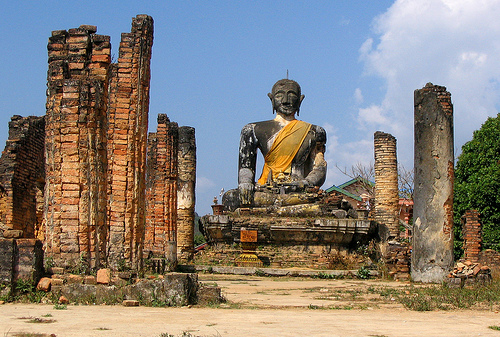When Mara asks the Buddha to produce a witness to confirm his enlightenment, the Buddha touches the earth. Why? Because buddhas are earthly beings and, being spiritually awake, they can see that all of life is in cahoots. “Why the Buddha Touched the Earth,” a recent piece at the Huffington Post, by John Stanley and David Loy explores this idea. Arguing that we have a responsibility to protect our earth through “sacred activism,” Stanley and Loy introduce the idea of the “ecosattva.” (Not to be confused with Clark Strand’s “Green Bodhisattva.”)
As the Buddha’s enlightenment reminds us, our awakening too is linked to the Earth. The Earth bore witness to the Buddha, and now the Earth needs us to bear witness—to its dhyana, its steadfastness, the matrix of support it continually provides for living beings. New types of bodhisattvas—”ecosattvas”—are needed, who combine the practice of self-transformation with devotion to social and ecological transformation.

Interested readers can learn more about what it means to be an “ecosattva” at the Ecobuddhism Project.
If you don’t find yourself pulled in the direction of social activism, that’s OK… it just means that you aren’t enlightened yet. It’s not too late, you can still get there by changing the contours of your character in such a way that will allow you to understand and practice such ideals. This might require some heavy lifting in the meditation department. One good place to look for meditation tips is Ken McLeod’s Unfettered Mind (recently relaunched). McLeod is a direct and clear teacher, and in posts like “Up Against a Wall? Sources of Unnecessary Confusion” he can help dispel confusion about the ins and outs of meditation. He writes:
The purpose of meditation practice is to cultivate attention. The method is what we do to cultivate attention: place attention on the breath and rest. Effects are the experiences that arise in meditation practice. Results are the qualities and abilities that develop from doing the practice.
Up against a wall? Read the rest here.
Perhaps I spoke too harshly a moment ago, when I said you weren’t enlightened. What is enlightenment, anyway? It’s something Buddhists talk about all the time, but as Lewis Richmond points out in his Huffington Post piece “A Cultural History of the Word ‘Enlightenment’,” the word also refers to the 18th century rationalist movement in Europe. As well as talking about the history of “enlightenment,” Richmond is curious about the future of the word.
It will be interesting to see how the next generation of Buddhist teachers and practitioners deal with the cultural history (and baggage) of the word “enlightenment.” Maybe they will bypass it; maybe they will change it. I have a feeling that whatever they do they will come up with their own rather different understanding (and possibly mis-understanding) of this deep matter.
I might not be able to tell you what enlightenment is, but I can show you what it looks like. One example I’d point to is Burmese political activist Aung San Suu Kyi. You can watch a recent interview with her by Ramsey Nasr below. She sounds like she might be talking about enlightenment when she talks about freedom.